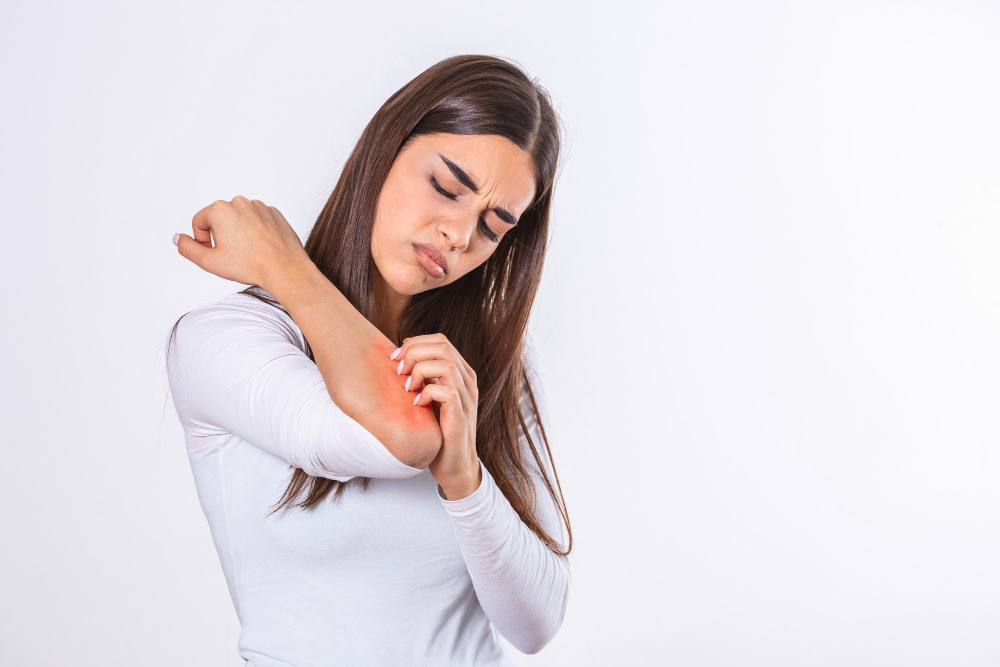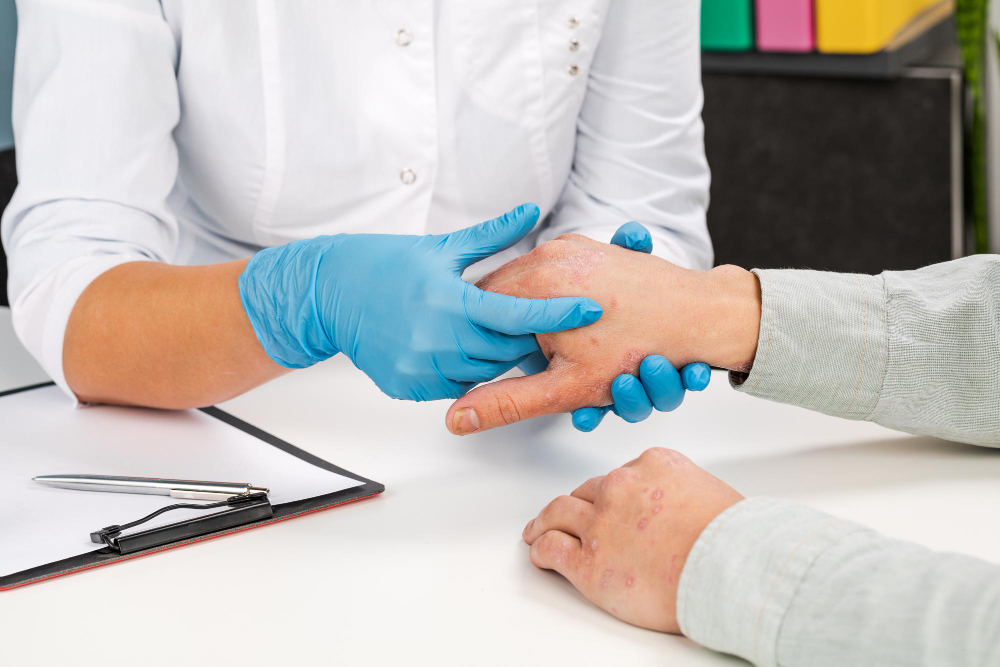What is eczema? Symptoms & Treatment Methods


Eczema, also known as atopic dermatitis, has distinct clinical features in people of different ages and racial groups. A red flashing and itchy skin are the common presentations of this disease. It commonly affects young adults but can happen to any person at any stage of their life. The patients usually have a family history of allergies. Although no permanent treatment has been introduced for eczema, doctors give symptomatic treatment to relieve painful itching. Allergic reactions are considered the leading cause of eczema. In addition, atopic dermatitis is associated with other complications like asthma and hay fever. Environmental triggers include smoke and pollen. Other irritants include soaps or certain fragrances.
Research has suggested that atopic dermatitis affects 11-20% of children and 5-10% of adults in the United Kingdom. See more about these statistics with the National Library of Medicine. Eczema occurs in people of all ages, races and ethnic groups. Although, it has the highest prevalence in young adults under 20. Studies have also manifested that atopic dermatitis affects more women than men. In addition, people, who have a family history of eczema, are more likely to develop the condition than those who do not have a family history.
Eczema looks different. You may have flare-ups at other times. Itchy skin can occur in most of your body. It may also start when the rash appears. It can happen to babies' skin and it may cause oozing, crusty-like skin - especially on the face and neck. It can also occur on the arms, legs, back and chest. In the case of kids and teens, a rash may occur in a bent elbow, behind a knee, or behind a head. The skin becomes scaly and dry.
Itchy skin is the key clinical symptom. The severity of the itchy is dependent on the stage of the condition. A red rash and plaque may also appear on the face and neck in some cases. Itching occurs most often on the flexure surface of elbows and knees joints. In the advanced stage, the skin becomes dry and hyperpigmented. Exudative patches erupted on the involved skin, and rupture resulted in diffuse weeping skin. Eczema must be differentiated from other skin diseases such as seborrheic dermatitis, scaly lesions, Psoriasis, and herpetic infections.
The diagnosis is made based on the patient's history and clinical findings. Laboratory findings have a small role in diagnosis. However, it is known that patients with eczema have an increased level of eosinophilia and IgE antibodies.
Although eczema is an allergic reaction of the skin to the external environment, everything which can trigger the allergic reaction can be a risk factor for eczema. These include all detergents used daily, such as soap, cosmetic products, and perfumes. These chemicals irritate our skin and spark allergic reactions. Therefore, determination of allergens is needed to avoid them in daily routine life.

The immune reaction is the chief cause of Eczema disease. Allergen found in our daily used products activates this reaction, resulting in itchy and red skin. In addition, IgE antibodies are present in our immune system, react to allergens, and release histamine. Histamine often causes itching and red patches. Other symptoms include cutaneous skin rash
Types of eczema include Dyshidrotic Eczema and contact dermatitis. Symptoms vary for each condition. It has been associated with many other allergic diseases and often occurs in children. When your skin contacts a substance that can irritate. This trigger is likely causing pain, inflammation, itching or allergic reactions. Symptoms can vary by dermatitis type. It is the less commonly known but harder-to-reach form of eczema.
Eczema is a potentially life-threatening condition. If eczema remains untreated, it causes serious skin problems. The skin becomes dry and red plaque spreads all over the body. The infection may involve the cornea of the eye resulting in complete blindness. Asthma and hay fever are also linked to atopic dermatitis. Other complications include cardiac disease, sepsis, and skin carcinoma.
Eczema develops due to an allergic reaction. Thus prevention is more critical in this disease than treatment. The patient should stay away from all those that trigger the allergic reaction.
It is recommended that those with eczema keep the skin moist and avoid prolonged exposure to the sun. You must not apply soap and detergent to the skin. In addition, parents with eczema should vaccinate their children against allergies.
Eczema needs regular and timely treatment. The patient should visit a doctor when the first sign and symptoms appear. The disease should be treated as soon as possible to prevent it from worsening.

No tests will identify eczema. Your doctor can probably determine this problem by examining your skin. The most common allergy test is done on a child who is allergic to the eczema rash. If your dermatologist is diagnosing your eczema ask:
Apart from medication, preventative treatments and general measurements are essential in eczema treatment.
General measures play a crucial role in the treatment of eczema. Anything that causes dryness of the skin must be avoided. The dry skin triggers the immune system and causes irritations. Patients with eczema should not take baths frequently. Detergent and soap should not be applied to the skin affected by eczema.
Local medicines in gel form should be applied on eczema-involved skin to relieve pain and itching. Corticosteroids are used for this purpose. For example, a gel containing dexamethasone should be applied twice daily on the affected skin. It must be rubbed well to penetrate deep into the skin layers.
Systemic treatment is needed when the symptoms are exacerbated. Corticosteroid prednisone is prescribed to suppress the immune reaction. This medicine is taken orally two or three times a day, depending on the severity of the condition. Usually, 1mg/ kg is recommended for adult patients.
Bacterial infections can also occur secondary to eczema. If this occurs, systemic antibiotics are prescribed to eradicate the bacteria. Antibiotics such as doxycycline, amoxicillin, and clarithromycin are used for this task.
If the patient develops complications, then the patient should be hospitalised.
The patient should be monitored regularly to avoid any adverse reactions to the medicines. The topical drugs must be used with great care because they may further trigger the symptoms. Local lotions and cream can leave dark spots on the patient skin. Steroid medicine used for systemic treatment has side effects such as sleep disturbance, hypertension and hair loss, to name a few.
Atopic dermatitis is a life-threatening condition, but timely intervention can prevent it from worsening. Studies have shown that only 50-60% of people have lasting remissions.
The good news is that eczema is not contagious. No one will catch eczema or transmit it to another person. Eczema does not mean you have skin infections, or that they spread. Many people are surprised by eczema which occurs within families. Eczema can occur from a range of different causes, including your immune system genetics, and environment.
Eczema can be an unpleasant condition to have but it is luckily treatable.
Plus get the inside scoop on our latest content and updates in our monthly newsletter.